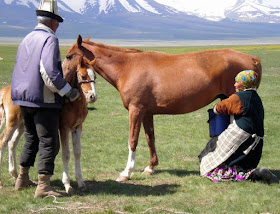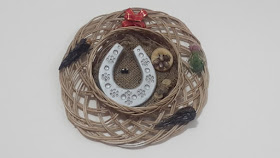 |
| Kyrgyz couple milking a mare |
Its superstitions are equally numerous and diverse. This post concludes the look at Kyrgyz superstitions, started last week.
6. Take care of your livestock, because they take care of you.
This is less of a superstition and more of a practical necessity in a country where much of the population of six million people depends on animal husbandry as a way of life.
Nevertheless, beyond the oft-repeated common-sense mantra madli tebbe, bashka, sappa (don't kick the cattle, don't hit its head), there are plenty of negative omens — too numerous to cite here — that cling to sick horses and cows like unwanted fleas.
7. Flush away your bad dreams
If a person has a nightmare or insomnia, Kyrgyz will sometimes put bread, wheat, or table knives under a pillow to keep bad dreams at bay. Elders even recommend telling your nightmare to flowing water; this will flush away the memories of the bad dream.8. Dog versus tooth fairy
 |
| Little girl on the left has no doubt tossed her tooth to a dog! |
Rather, they fill the fallen tooth with bread, approach a neighbourhood dog, and throw their tooth to the dog, shouting: “Take a bad tooth, and give me a good one!”
9. Tea is best served one drop at a time
Like many other cultures, people in Kyrgyzstan sometimes see bubbles in a bowl of tea as evidence of good luck or future prosperity. Where Central Asian tea-traditions differ is in the serving of tea.
On visiting a Kyrgyz home you might find you are constantly being served half a cup of tea. You are not being shorted. In fact, the host is showing you that he or she does not want you to leave.
When it is time for you to go, they will let you know by pouring you a full cup!
10. A myriad of superstitions related to new brides
A daughter-in-law or kelin has the lowest rank in a Central Asian household, and as such is inundated with superstitions even before she begins married life.
Typically, when a new kelin arrives in her husband’s home for the first time, she is supposed to bow three times to the guests and her parents-in-law as a sign of respect and reverence.
 |
| A new bride - kelin - arrives in her husband's home. Image: Elita Bakirova and Erlan Bakirov |
Another superstition threatens that if the young woman takes even a covert disliking to one of her husband’s relatives or her mother-in-law, her next child will resemble that relative.
Yet another old wives' tale sees people avoid distributing the tongue of a sacrificial sheep to girls at feasts. The assumption is that eating a tongue might make a young girl a sharp-tongued kelin in her new family, rather than the subservient variety that is favoured.
Conversely, when a chicken is divided among family members, daughters get chicken wings, as an encouragement to fly the family nest!
Finally, by the time the kelin meets her husband's parents, she should have no excuses for leaving dishes unwashed until the following morning, as this will have been drummed into her by her mother from an early age.
Supposedly, it is forbidden to leave dishes unwashed until the next morning because dirty dishes will attract evil spirits. But is this a actually a superstition or just a creative way of encouraging girls to be neat and tidy? Who knows?
This article by Elita Bakirova and Erlan Bakirov originally appeared on Global Voices on 15 February 2017. It is re-published with permission.
Related posts: Kyrgyzstan: Unusual Superstitions - Part #1
Kyrgyz Blues
100 Experiences of Kyrgyzstan
Kyrgyzstan: Hunting with Birds of Prey



